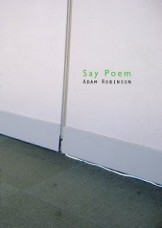Filling out an online dating profile using only sentences from Clarice Lispector novels:
1: I want the adult who is more primitive and ugly and drier and more difficult, and who became the child-seed that cannot be broken between the teeth.
2: I want the inhuman inside the person; no, it isn’t dangerous, since people are human anyway, you don’t have to fight for that: wanting to be human sounds to pretty to me.
3: My own innocence? It hurts me. Because I also know that, on a solely human level, innocence is having the cruelty that the roach has with itself as it is slowly dying without pain; to go beyond pain is the worst cruelty.
4: Identity can be dangerous because of the intense pleasure that could become mere pleasure. But now I’m accepting loving the thing!
5: I, person, am an embryo. The embryo is only sensitive–that is its only particular inherence. The embryo hurts. The embryo is eager and shrewd. My eagerness is my most initial hunger: I am pure because I am eager.
6: How would you know you met your ideal partner? ” Through a love so great that it would be of such an indifferent personal–as if I were not a person. He wanted for me to be the world with Him. He wanted my human divinity, and that had to start with an initial stripping-down of the constructed human.”
7: Guess at me, guess at me because it’s cold, losing the lobster’s casings is cold. Warm me up with your guesses about me, understand me because I am not understanding me. I am only loving the roach. And it’s a hellish love.
8: Use me at least like a dark tunnel–and when you’ve crossed my darkness you’ll find yourself on the other side with yourself.
9: Identity is forbidden to me but my love os so great that I won’t resist my will to enter the mysterious fabric, into that plasma from which I may never again be able to depart.
10: What would you say to your last ex? “Ah, how I wanted pain then: it would distract me from the great divine void that I had with you.”






